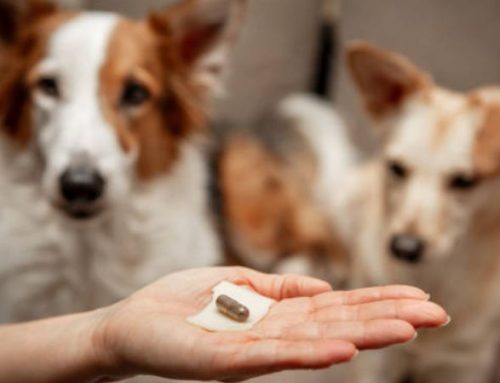When your dog’s tummy is upset, it’s more than just a mess it’s a sign that their digestive system needs a little extra support. Probiotics can be a game-changer, helping restore balance to the gut, calm inflammation, and get your furry friend back to their playful self. From occasional digestive troubles to persistent diarrhea, the right probiotic can make a noticeable difference in both health and comfort.
In this guide, Nexus Pets breaks down the TOP 7 best probiotics for dogs with diarrhea, highlighting vet-recommended options that are safe, effective, and easy to use.
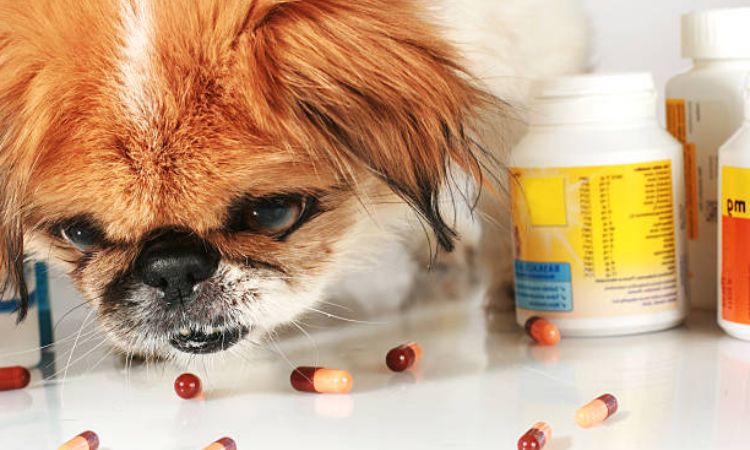
Causes of Diarrhea in Dogs
Diarrhea in dogs is a common digestive issue that can range from mild and temporary to severe and chronic. Understanding the underlying causes is crucial for effective management and treatment. Veterinarians categorize the triggers of diarrhea into several key areas:
1. Dietary Changes or Food Intolerance
Sudden changes in a dog’s diet are among the most frequent causes of diarrhea. Introducing a new type of food, switching brands, or giving table scraps that are rich, fatty, or unfamiliar can upset your dog’s digestive system. Similarly, food intolerances or sensitivities—such as reactions to certain proteins, grains, or additives—can trigger gastrointestinal distress and loose stools. Monitoring how your dog reacts to new foods and gradually transitioning diets over 7–10 days can help minimize digestive upset.
2. Infections (Bacterial, Viral, Parasitic)
Dogs are susceptible to various infections that affect the gastrointestinal tract. Bacterial infections, such as those caused by Salmonella or E. coli, can lead to acute diarrhea, while viral infections like parvovirus or canine coronavirus can cause more severe, sometimes life-threatening episodes. Parasitic infections, including Giardia, Coccidia, or roundworms, may also result in diarrhea, often accompanied by other symptoms like vomiting, lethargy, or weight loss. Prompt veterinary diagnosis is essential to treat infections effectively.
3. Stress and Environmental Factors
Stressful situations can upset a dog’s gastrointestinal balance, resulting in diarrhea. Common stressors include moving to a new home, boarding, loud noises, or changes in daily routines. Stress-induced diarrhea is typically temporary but may require supportive care such as dietary adjustments, probiotics, and stress-reduction strategies to help stabilize the gut.
4. Antibiotic-Associated Diarrhea and Clostridium difficile
While antibiotics are necessary for treating certain infections, they can disrupt the natural balance of gut bacteria. This imbalance may lead to antibiotic-associated diarrhea, which is sometimes linked to overgrowth of Clostridium difficile, a bacterium that can cause severe gastrointestinal upset. Veterinarians may recommend probiotics or specific dietary interventions to restore healthy gut flora during or after antibiotic therapy.
5. Underlying Health Conditions (IBS, Allergies)
Chronic or recurrent diarrhea can signal deeper health issues. Conditions such as irritable bowel syndrome (IBS), inflammatory bowel disease (IBD), or food allergies can inflame the intestines, alter nutrient absorption, and trigger frequent loose stools. Other systemic conditions, including kidney or liver disease, hormonal imbalances, or gastrointestinal tumors, may also present with diarrhea as a symptom. Identifying the root cause through diagnostic testing is critical for long-term management.
By recognizing the potential causes, pet owners can better monitor their dogs’ health and seek timely veterinary care. Early intervention not only prevents complications but also ensures that the treatment plan is tailored to your dog’s specific needs, whether that involves dietary management, medication, or supportive supplements like probiotics.
How to Choose the Best Probiotic for Your Dog
Selecting the right probiotic for your dog can be a game-changer for digestive health, immune support, and overall well-being. With so many options available, understanding the key factors that make a probiotic effective is essential to ensure your dog gets real benefits.
Key Probiotic Strains Effective for Diarrhea
Not all probiotics are created equal. Certain strains have been clinically studied and are particularly effective for managing diarrhea and supporting gut health in dogs. Among the most widely recommended by veterinarians are:
- Enterococcus faecium – Known for restoring gut balance after stress, sudden diet changes, or illness, E. faecium is often used in veterinary formulas to prevent and reduce diarrhea.
- Bifidobacterium animalis – Supports healthy stool consistency and strengthens the intestinal lining, helping dogs recover from digestive upset more quickly.
- Lactobacillus strains – Including Lactobacillus acidophilus, L. casei, and L. rhamnosus, these probiotics enhance nutrient absorption, normalize gut flora, and reduce inflammation in the digestive tract.
- Bacillus subtilis – A resilient spore-forming probiotic that helps balance gut bacteria even in harsh stomach conditions, making it effective for acute diarrhea episodes.
Choosing a probiotic that contains these specific strains increases the likelihood that your dog will experience measurable improvements in digestion and stool quality.
Importance of Strain Specificity and Scientific Backing
When evaluating probiotics, it’s important to pay attention to the exact strains included. Each strain offers unique benefits, and the effectiveness can vary widely between them. Look for products that clearly list the strain, such as Enterococcus faecium SF68 or Bifidobacterium animalis AHC7, and ensure the claims are supported by peer-reviewed studies or veterinary research. Products with documented efficacy are more likely to deliver the results you expect.
CFU Count and Dosage Considerations
CFU, or colony-forming units, indicate the number of live microorganisms in each serving. For dogs, probiotics typically range from 1 billion to 10 billion CFUs per day, though higher counts may be recommended in specific situations, such as acute diarrhea or stress-related gut imbalances. Following the manufacturer’s dosage instructions—and adjusting based on your veterinarian’s guidance—is crucial for safety and effectiveness.
Forms Available: Powder, Capsules, Chews, Liquids
Probiotics for dogs come in multiple forms to suit different lifestyles and preferences:
- Powders – Easy to mix with wet or dry food, ideal for picky eaters or dogs that require precise dosing.
- Capsules – Convenient for larger dogs, and can be opened and sprinkled over food if swallowing is an issue.
- Chews or Treats – Often flavored, making daily supplementation simple and enjoyable for dogs.
- Liquids – Useful for puppies, small dogs, or pets with swallowing difficulties, and can be added to meals or water.
Selecting a form your dog accepts consistently is important, as probiotics only work if administered regularly.
Consulting a Veterinarian
Before introducing any probiotic, it’s always best to consult your veterinarian. They can recommend strains, dosages, and products based on your dog’s age, health status, dietary needs, and history of digestive issues. Your vet can also advise whether a probiotic should be used as a preventive measure or as part of a treatment plan for ongoing diarrhea or other gastrointestinal concerns.
7 Best Probiotics for Dogs with Diarrhea
1. PetHonesty Probiotics for Dogs
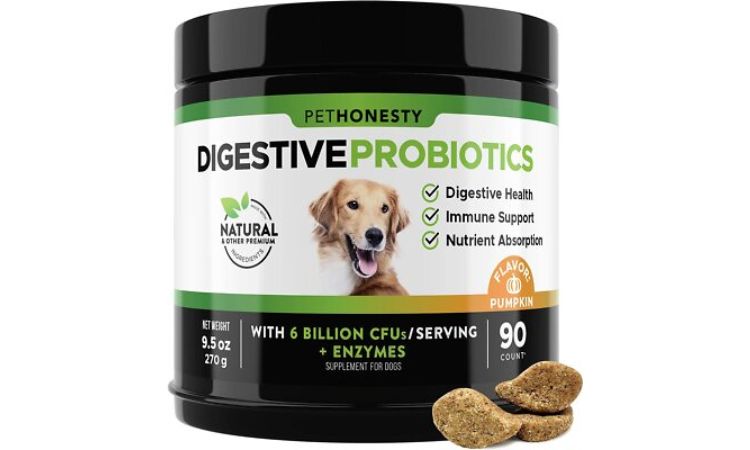
PetHonesty offers a comprehensive formula designed to support digestive health in dogs prone to diarrhea. This supplement provides a high CFU count to ensure sufficient colonization of beneficial bacteria in the gastrointestinal tract. It contains multiple strains, including Lactobacillus and Bifidobacterium species, which work synergistically to improve gut balance. In addition, the inclusion of prebiotics nourishes these good bacteria, enhancing their activity and promoting longer-lasting digestive stability. Its combination of strains and prebiotics makes it a reliable choice for both puppies and adult dogs experiencing gastrointestinal upset.
2. Nutramax Proviable-DC
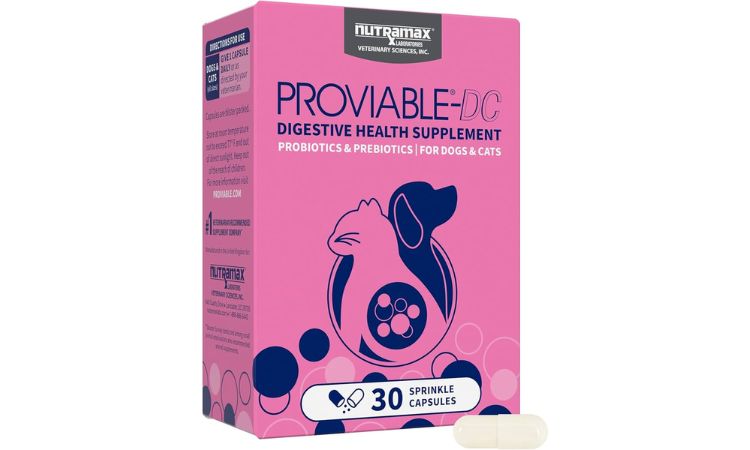
Nutramax Proviable-DC is a veterinarian-approved probiotic with a multi-strain formula that targets digestive imbalances. Containing seven different bacterial strains, it is designed to provide broad-spectrum support for the canine gut. Prebiotics are also included to stimulate the growth of beneficial microorganisms, ensuring a healthier microbiome. Its dual-action approach makes it particularly effective for antibiotic-associated diarrhea (AAD) and other temporary digestive disturbances. Proviable-DC can be sprinkled over food, simplifying administration even for picky eaters, and is suitable for long-term or short-term use under veterinary guidance.
3. Zesty Paws Probiotic Bites
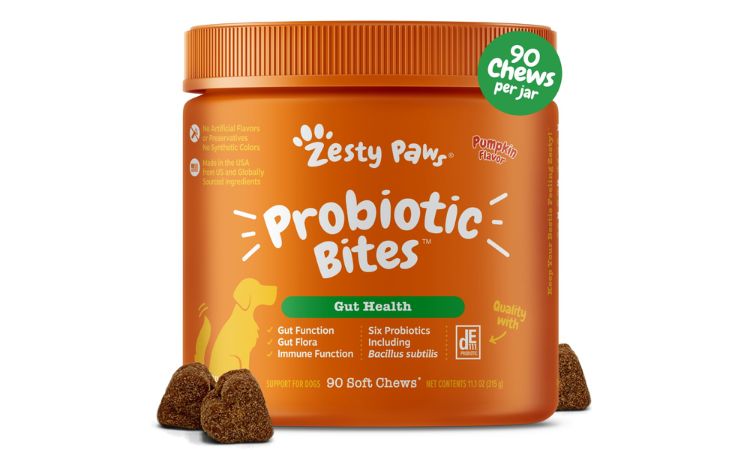
Zesty Paws Probiotic Bites are specifically formulated for diarrhea-prone dogs. These chewable supplements combine multiple probiotic strains with palatable flavors, making them easy to administer as a daily treat. The multiple strains target different aspects of gut health, including stool consistency, reduction of gas, and support for overall intestinal function. This product is particularly useful for dogs who resist traditional capsules or powders, providing a stress-free method of probiotic supplementation while addressing acute or recurring gastrointestinal issues.
4. Visbiome Vet High Potency Probiotic
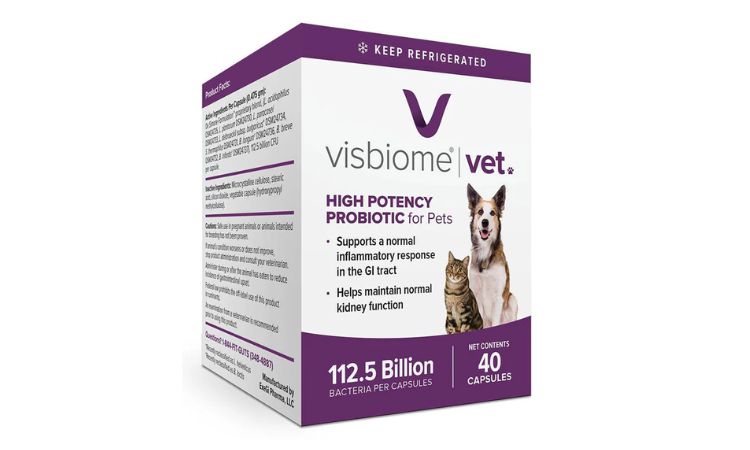
Visbiome Vet is a high-potency probiotic known for its elevated CFU count, making it ideal for dogs suffering from chronic gastrointestinal problems, including persistent diarrhea. It contains a concentrated mix of Lactobacillus and Bifidobacterium strains with strong clinical evidence supporting their efficacy. This supplement is particularly suitable for long-term management of gut health in dogs with inflammatory bowel disease (IBD) or those recovering from repeated episodes of digestive upset. Its high-potency formula ensures robust colonization and helps restore a healthy microbial balance in the intestines.
5. Bacillus subtilis C-3102 (Calsporin®)
Bacillus subtilis C-3102, also marketed as Calsporin®, is a spore-forming probiotic that is exceptionally stable under heat and humidity, making it highly reliable for long-term use. The spore-forming nature allows the bacteria to survive the acidic environment of the stomach and reach the intestines intact. It supports gut health by enhancing the activity of beneficial bacteria, regulating digestion, and improving nutrient absorption. Studies show that C-3102 is effective in reducing diarrhea episodes, particularly in dogs exposed to dietary stress or environmental changes. Its stability and proven efficacy make it a cornerstone for canine gastrointestinal support.
6. Bifidobacterium animalis AHC7
Bifidobacterium animalis AHC7 is clinically recognized for its role in reducing acute diarrhea, including episodes linked to Clostridium difficile overgrowth. This strain directly inhibits the proliferation of harmful bacteria, supports the gut lining, and helps restore normal stool formation. Research demonstrates that supplementation with AHC7 shortens the duration of diarrhea while maintaining a balanced microbial environment. Its targeted action makes it an ideal option for dogs experiencing sudden digestive disturbances or those recovering from gastrointestinal infections.
7. Enterococcus faecium NCIMB 10415
Enterococcus faecium NCIMB 10415 is one of the most well-studied probiotic strains for dogs. Multiple clinical trials have shown that it improves stool consistency, reduces gastrointestinal upset, and supports overall gut flora. Its efficacy is particularly notable in shelter environments, where stress and diet changes often trigger diarrhea. This strain is often combined with prebiotics to enhance the growth of beneficial bacteria and provide long-term digestive support. Its safety profile, stability, and clinical backing make it a go-to choice for veterinarians recommending probiotics for diarrhea management in dogs.
How to Administer Probiotics to Your Dog

1. Recommended Dosages Based on Product Instructions
Each probiotic product has its own dosage guidelines, typically based on the dog’s weight, age, and the specific strains included. Dosages are often measured in Colony Forming Units (CFU), which indicate the number of viable bacteria in the product.
- Low-potency probiotics (1–5 billion CFU per serving) are generally suitable for maintaining gut health in healthy dogs or for minor digestive issues.
- High-potency probiotics (10 billion CFU or more) are recommended for dogs with chronic gastrointestinal issues, antibiotic-associated diarrhea (AAD), or severe diarrhea episodes.
Always follow the manufacturer’s instructions and consult your veterinarian to ensure the correct dosage for your dog’s specific condition. Overdosing is usually not harmful with probiotics, but extremely high amounts can occasionally cause mild digestive upset, such as gas or soft stools.
2. Tips for Administering Powders, Chews, or Capsules
Probiotics come in multiple formats, each with advantages and practical tips for administration:
Powders:
- Powders are highly stable, especially in dry forms, and are ideal for precise dosing.
- Sprinkle the powder directly over your dog’s food or mix it into a small portion of wet food.
- Ensure your dog consumes the entire portion to receive the full dose.
- Avoid heating the food, as excessive heat can reduce bacterial viability.
Chews and Soft Treats:
- Chewable probiotics are convenient and often flavored to appeal to dogs.
- Offer as a daily treat or alongside meals to encourage consumption.
- Ensure your dog chews the treat fully to release all active bacteria.
Capsules or Tablets:
- Capsules can be hidden in soft food or treats if your dog resists swallowing pills.
- Some capsules can be opened and sprinkled over food, but verify with the product label to ensure the strain remains viable.
- Administer at the same time each day to maintain consistent probiotic levels in the gut.
3. When to Start and Duration of Probiotic Use
When to Start:
- Probiotics can be introduced at any stage of life, from puppies to senior dogs.
- Start probiotics when your dog is healthy as a preventative measure or during periods of stress, illness, antibiotic therapy, dietary changes, or gastrointestinal upset.
- For puppies, introducing probiotics early can help establish a healthy gut microbiome, supporting digestion and immunity.
Duration of Use:
- The duration depends on the dog’s condition and the type of probiotic.
- Short-term use: Typically 1–4 weeks for acute diarrhea or antibiotic-associated gut imbalance.
- Long-term maintenance: Daily administration may be recommended for ongoing digestive support, weight management, or immune system optimization.
- Consistency is key. Probiotics need time to colonize the gut and rebalance microbiota, which may take several days to a few weeks.
4. Monitoring Your Dog’s Response
Tracking your dog’s response to probiotics is essential to evaluate effectiveness and adjust administration if necessary. Key factors to monitor include:
Stool Quality:
- Firmness, color, and frequency of bowel movements are the primary indicators of digestive improvement.
- Softer or watery stools should gradually become firmer and more regular.
Appetite and Energy Levels:
- Effective probiotics can improve appetite, reduce bloating or gas, and enhance energy and activity levels.
Digestive Comfort:
- Observe for any temporary side effects, such as mild bloating, gas, or slight diarrhea. These often resolve as the gut adjusts.
- If persistent digestive upset occurs, consult your veterinarian and consider adjusting the dosage or switching strains.
Behavioral Signs:
- Some gastrointestinal issues are linked to stress or anxiety. Improvement in digestive health may also positively impact mood and behavior.
Veterinary Follow-Up:
- For dogs with chronic or severe gastrointestinal conditions, periodic check-ins with a veterinarian are recommended to assess stool health, weight, and overall gut microbiota balance.
Administering probiotics to your dog effectively requires choosing the correct product type, following dosage instructions, maintaining consistent administration, and carefully monitoring your dog’s response. When done correctly, probiotics can help restore gut balance, improve digestion, support immune health, and contribute to your dog’s overall well-being. Always consult with a veterinarian for tailored recommendations, especially for dogs with sensitive stomachs, chronic digestive issues, or underlying medical conditions.
Related Reads:



